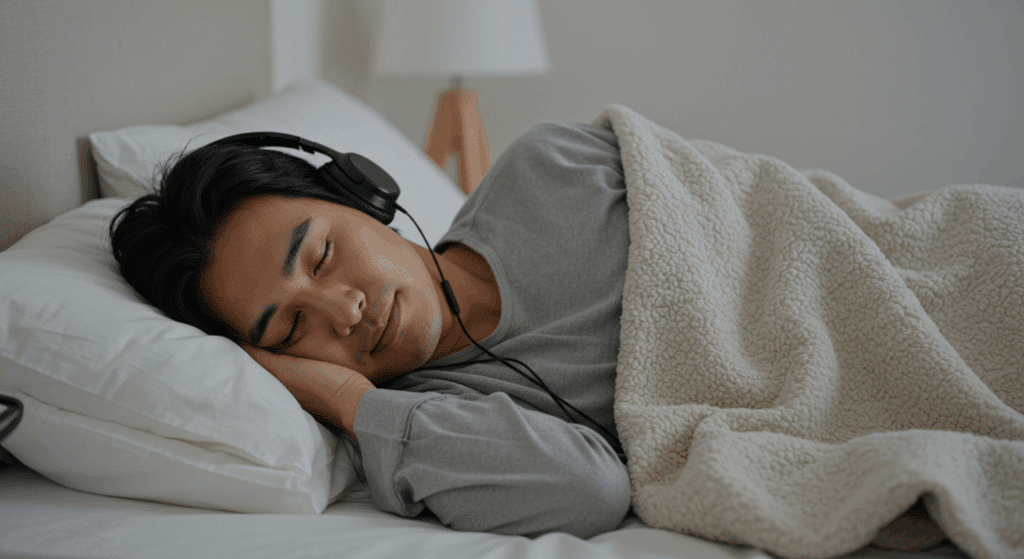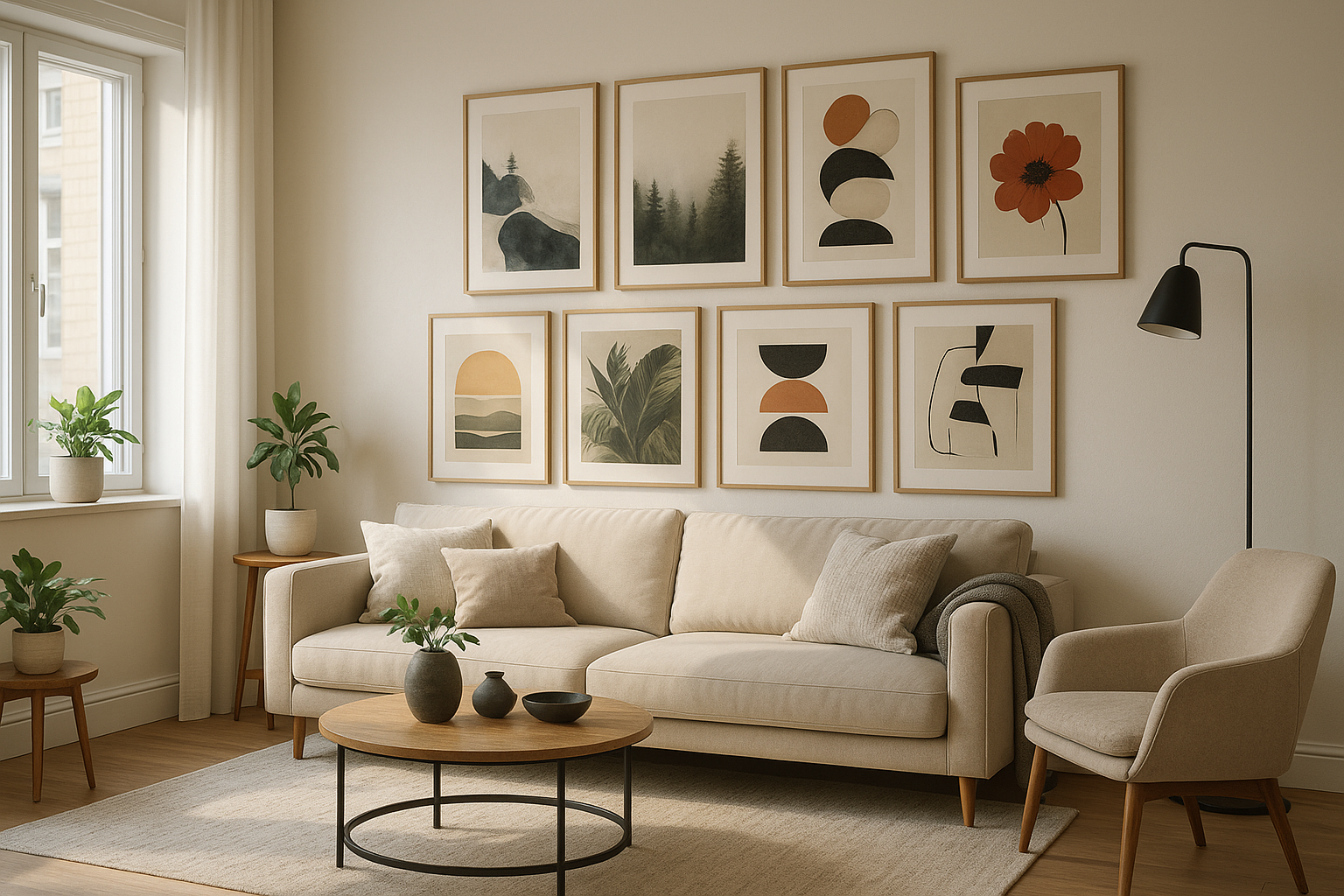Anúncios
How Does Music Impact Your Sleep?
Have you ever struggled to fall asleep, tossing and turning, with your mind racing?
😴 You’re not alone. Millions of people around the world face restless nights, searching for ways to get better, deeper sleep. But what if the solution could be as simple as pressing “play” on the right melody?
Anúncios
Research shows that calming music can be a game-changer for your sleep quality.
In fact, big names like Dr. Michael Breus, also known as “The Sleep Doctor,” emphasize how music therapy can help relax your mind and body.
Anúncios
But what makes certain melodies so effective? And how can you use them to create your perfect bedtime playlist? 🎶
In this article, you’ll discover the power of soothing sounds, explore how music can impact your brainwaves, and learn tips to build a sleep-friendly nighttime routine.
Ready to unlock the secret to waking up feeling refreshed and energized? Keep reading to find out! 🌙

Unlock Better Sleep with These Soothing Melodies! 🎵
Have you ever found yourself tossing and turning at night, staring at the ceiling, unable to fall asleep? You’re not alone. Many people struggle with getting a good night’s sleep, and this has a profound impact on our physical and mental well-being. But what if the secret to deeper, more restful slumber lies in something as simple as music?
Music therapy, especially soothing melodies, has been shown to improve sleep quality by reducing stress, calming the mind, and helping the body ease into a relaxed state. Let’s explore how certain types of music can unlock the restful nights you’ve been dreaming of! 💤
Related Articles:
How Does Music Impact Your Sleep?
Have you ever noticed how a favorite song can instantly change your mood? Music has the power to influence your emotions and physical state. When it comes to sleep, the right kind of music works by:
- Reducing Stress: Slow, calming rhythms can decrease levels of cortisol (the stress hormone), helping your body relax.
- Lowering Heart Rate and Blood Pressure: Melodies with slower tempos can physically slow down your body’s processes, signaling it’s time for rest.
- Improving Sleep Quality: Music has been shown to increase time spent in deep sleep, which is essential for physical recovery and mental restoration.
By listening to the right tunes, you’re essentially creating a soothing environment for both your mind and body. But what type of music works best for sleep?
What Type of Music is Best for Sleep? 🎶
Not all music is created equal when it comes to sleep. While your favorite upbeat pop song might make you happy during the day, it’s not likely to help you drift off at night. For better sleep, focus on music with these characteristics:
- Slow Tempo: Look for tracks with a tempo of around 60-80 beats per minute, which mimics the heart rate during relaxation.
- Instrumental or Minimal Lyrics: Lyrics can be stimulating and keep your mind active, so opt for instrumental tracks or soft vocals.
- Gentle Sounds: Genres like classical, ambient, or even nature sounds are often great choices.
Here are a few examples of music styles that can help improve your sleep:
| Music Genre | Characteristics | Why It’s Good for Sleep |
| Classical | Slow, melodic compositions | Promotes relaxation and reduces mental clutter |
| Ambient | Soft, atmospheric tones | Creates a calming, meditative environment |
| Nature Sounds | Rainfall, ocean waves, forests | Replicates the soothing rhythms of nature |
When Should You Listen to Sleep Music? ⏰
Timing is everything when it comes to using music as a sleep aid. Here are some tips for when and how to incorporate soothing melodies into your nighttime routine:
- 30 Minutes Before Bed: Start playing your sleep playlist about half an hour before you plan to go to sleep to help your body wind down.
- During Relaxation Activities: Combine music with activities like meditation, reading, or deep breathing exercises to amplify its calming effects.
- Throughout the Night: If you’re a light sleeper, consider leaving soft music playing throughout the night to block out background noise.
Can Music Replace Sleep Medications?
While music is a powerful tool for improving sleep, it’s important to remember that it’s not a substitute for medical treatment. If you suffer from chronic insomnia or other serious sleep disorders, you should consult a healthcare professional.
However, many people find that adding music to their nightly routine reduces their reliance on sleeping pills or other interventions. Unlike medication, music has no side effects and can be tailored to your preferences, making it an excellent natural solution.
FAQs About Music and Sleep
Does it matter what language the music is in?
Not necessarily, but keep in mind that lyrics—regardless of the language—can engage your brain and keep you awake. Instrumental tracks are often a safer bet.
Can I use headphones while sleeping?
Yes, but be cautious. Using headphones or earbuds for long periods can cause discomfort or even ear infections. Consider using a pillow speaker or playing music softly through a speaker in your room.
What if I don’t like classical or ambient music?
No problem! The best music for sleep is the kind that you personally find relaxing. Experiment with different genres until you find what works best for you.
Can I create my own sleep playlist?
Absolutely! In fact, creating a personalized playlist can be even more effective since it’s tailored to your preferences. Just keep the focus on slow tempos and calming tones.
Conclusion
In conclusion, unlocking better sleep through soothing melodies is a simple yet powerful way to improve your overall well-being. 🎶 By embracing music therapy, you can create a calming bedtime ritual that helps you achieve deeper, more restful slumber. Remember, quality sleep is the foundation for a healthier, happier life! 🌟
Now, it’s your turn! Have you tried using music to enhance your sleep routine? What are your favorite calming tunes? Share your experiences in the comments below ⬇️ – we’d love to hear from you! 💬
Thank you for taking the time to explore this journey to better sleep with us. Your well-being matters, and we’re here to support you every step of the way! ❤️






